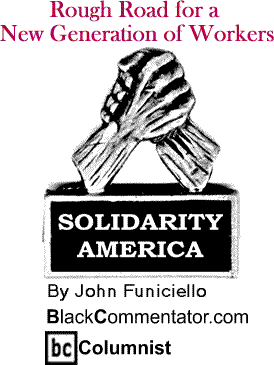
|
||||||||||||||||||||||

|
|

Custom Search
|
|
 |
|
American workers are in trouble.
When the press asks the question, it’s usually in the context of the presumption that organized labor is finished as a force in American life, that it can’t be the support and backbone of a strong working class that is the strength - economic and social, even cultural - of the communities in which they live. This
is a wrongheaded view, of course, but reporters are subject to the
same propaganda that everyone in the Several years ago, at a Labor Day picnic, a reporter for a local newspaper arrived at the event and spoke with several people in attendance. In discussing the event and the (bad) condition of labor, he was told that everything was not so negative and was invited to speak with some of the people who were more upbeat about the union movement. He said that he’d been sent by his editor to do a story about the demise of organized labor. Even though he spent considerable time talking with trade unionists and their supporters - many of them enthusiastic and upbeat - nothing could convince him otherwise. Next morning, the story about the demise of the union movement appeared in the paper and there was little mention of the positive outlook of some of those in attendance, even the ones who were - or were about to become - leaders of their unions at the local level. But,
it must be said, in the years since, it hasn’t looked so good for
unions and his editor may have thought his instruction simply had
been recognition of the inevitable. Most analysts and most pundits don’t look any further than the state of the unions when they assess the future of the labor movement. It’s hard for them to see that all workers, union and non-union, are suffering equally in a very unbalanced American economy. That is, the top two or three percent have incomes that are equal to about the bottom 40 percent, but no one seems to be analyzing the impact of these conditions on the country as a whole, and on the society. A discouraged people will not be productive and people whose livelihoods have been demolished by the economy don’t have the money to spend on the things that we’re told keep the American economy going. Remember that the first thing the people were told after the attacks of Sept. 11, 2001, was to go about their business: shop and consume. That was a time when we should have been thinking about things more important than consumer goods that likely found their way to landfills within six months. Most people pay lip service to the idea that the next generation needs to be brought along, cultivated, educated, so they can take their place in society and be the leaders. This is most important in organized labor, which needs to educate its youngest members about why there is a labor movement, how it came to be, and the struggles and suffering that brought it to life. The modern living standard was not given by the powers-that-be. It was won by millions of workers over generations. But the young don’t learn this in their grade schools or high schools. Unless they attend one of the handful of colleges that specifically teach labor history or labor studies, they don’t ever learn it until they are actually involved in organizing and leading their own unions. Since
the virtual demise of manufacturing and industry in The “service industry,” the “information technology industry,” and the “retail industry” that have replaced manufacturing and heavy industry have not lent themselves to mentoring or apprenticeships. When they enter life after college, many young workers are faced with the reality that the only jobs readily available are short-term and low-wage. None of the jobs in the “new sectors” present themselves as anything permanent and satisfying, so, as soon as they’re hired, they start looking for the next job. This is true, no matter what kind of degree or advanced degrees they have. These conditions don’t give much encouragement to young workers to get involved and to make a place for themselves in their first few jobs. Often, they think, “I probably won’t be around in a couple of months.” But, it’s the same feeling about where they live and the kind of society they might create for themselves. Many stay in these jobs, for which they are overqualified, for long periods of time, hoping that the economy will improve and they can get work that is good for them and satisfying.
Here are a few of the statistics: Thirty-four percent of workers younger than 35 still live at home with their parents; 31 percent of young workers report having no health insurance, up from 24 percent 10 years ago, and 79 percent of the uninsured say they don't have coverage because they can't afford it or their employer does not offer it; only 31 percent say they make enough money to cover their bills and put some money aside - 22 percentage points fewer than in 1999, and 7 in 10 do not have enough saved to cover two months of living expenses - a real danger when so many jobs are disappearing. Everyone wants their children to do well in life, but the conditions that existed for the past 45 years, or so, just don’t exist today. Success will have to be measured by other than how much money a worker makes or how big the house one lives in, or how luxurious a car one drives. All of these standard measures of success are going to have to be thrown out and a new standard created. There doesn’t seem to be one in the works and we don’t have a lot of time to do it. Surely, there are exceptions to the statistics in the new report (which can be read on the AFL-CIO website), but the numbers are of great concern, and we’re not just talking about organized labor here, we’re talking about the kind of society we’ve created for the coming generations. Fortunately, the union movement will be with us, as long as the right to organize is not rescinded by the Congress, because the aspiration of workers to represent themselves on the job is just as strong as that of the founders to represent themselves and govern themselves, without interference from the English crown. Unions are not going away, but they will have to change. To do well, unions will have to move well outside of their narrow concerns of the “bread and butter” issues of wages, benefits, and working conditions. They will have to fit into the society at large in a much more holistic way to attract the notice of young workers who are looking for something larger than themselves. Our economic system, our political system, and our other systems have put up a wall around young people, many of whom can’t see over it or through it and have come to believe that there’s nothing much on the other side, anyway.
The only reason for failure would be the unwillingness of millions of workers to stand in solidarity with one another, to set the goals they want to achieve, and then go to work. This might require a whole new culture of American unity, but we delay creating that new culture at our own peril. BlackCommentator.com Columnist, John Funiciello, is a labor organizer
and former union organizer. His union work started when he became
a local president of The Newspaper Guild in the early 1970s. He
was a reporter for 14 years for newspapers in |
|
 |
|
Any BlackCommentator.com article may be re-printed so long as it is re-printed in its entirety and full credit given to the author and www.BlackCommentator.com. If the re-print is on the Internet we additionally request a link back to the original piece on our Website. Your comments are always welcome. eMail re-print notice
If you send us an eMail message we may publish all or part of it, unless you tell us it is not for publication. You may also request that we withhold your name. Thank you very much for your readership. |
|
| |
|
| September10
, 2009 Issue 341 |
|
| Executive Editor: Bill Fletcher, Jr. |
| Managing Editor: Nancy Littlefield |
| Publisher: Peter Gamble |
| Est. April 5, 2002 |
Printer Friendly Version
in resizeable plain
text format or pdf
format. |
 |

|
| |
| |





























 There
are young workers, though - not a majority, certainly - who see
their future as more secure in the ranks of trade unionists.
There
are young workers, though - not a majority, certainly - who see
their future as more secure in the ranks of trade unionists.
 This
generation of young workers, under 35, is the subject of a new AFL-CIO
report, “Young Workers: A Lost Decade.” Its findings should be a
concern to all Americans. Economic researchers have pointed out
over the past several years that the coming generation will not
achieve economically what their parents achieved without college
degrees.
This
generation of young workers, under 35, is the subject of a new AFL-CIO
report, “Young Workers: A Lost Decade.” Its findings should be a
concern to all Americans. Economic researchers have pointed out
over the past several years that the coming generation will not
achieve economically what their parents achieved without college
degrees. The
union movement, one of the most potent engines of social improvement
and self-governance, should be the thing that knocks down the wall
of separation. With the simple tools available to every individual,
it can be done.
The
union movement, one of the most potent engines of social improvement
and self-governance, should be the thing that knocks down the wall
of separation. With the simple tools available to every individual,
it can be done.









